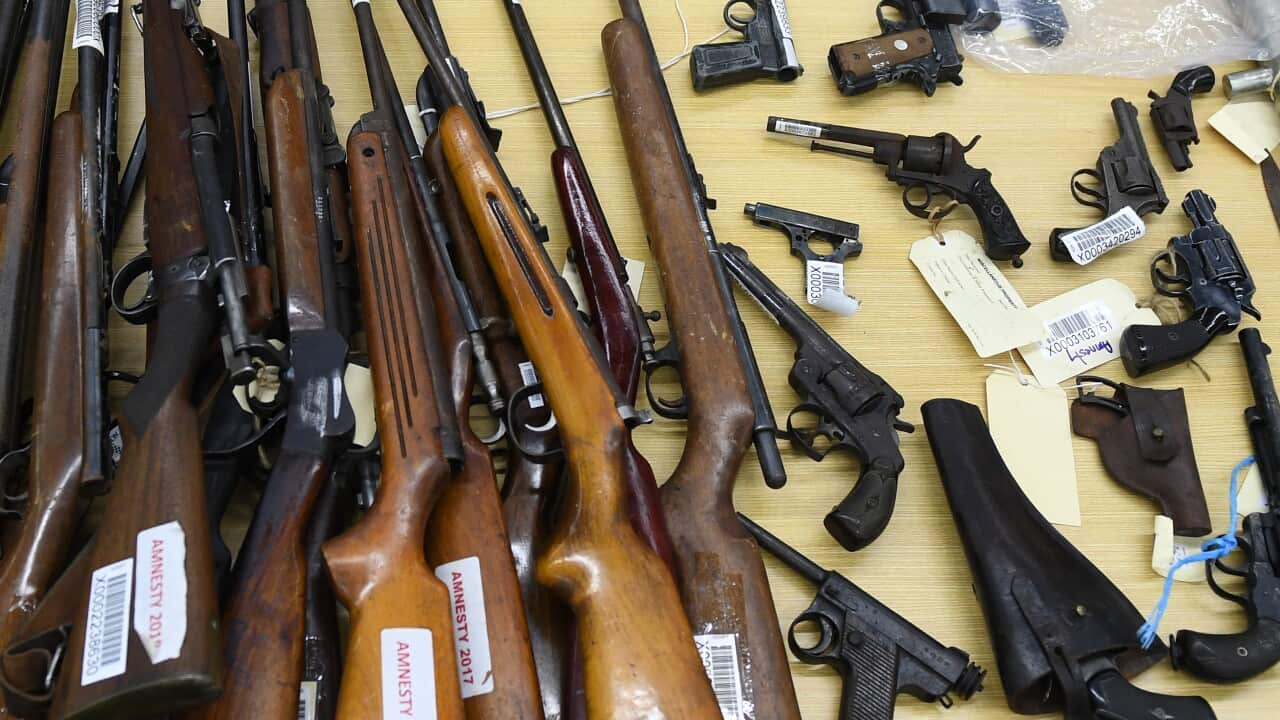The recent shooting of two police officers in rural Victoria has reignited questions about the licensing and ownership of firearms in Australia, with advocates warning of public "complacency" in the face of a "very aggressive" gun lobby.
Gun Control Australia president Tim Quinn says Australians "are very, very proud of their gun laws, but there is a level of complacency in the community that everything's absolutely fine".
He says that, even though 97 per cent of Australians don't own or use firearms, an erosion of gun control laws introduced in the wake of the 1996 Port Arthur massacre means there are now more legal guns circulating than ever.
The Port Arthur massacre, in which a gunman in Tasmania killed 35 people and injured 18 others, remains the most deadly mass murder in Australia's modern history.
In its wake, then prime minister John Howard brought together states and territories — which have a constitutional responsibility for the relevant firearm regulation — to reach a national agreement on gun control legislation, including a major buyback of guns.
"We need to make sure that governments and police and everybody who has some sort of jurisdiction over this are protecting that 97 per cent of Australians and not giving into the gun lobby," he added.
The power of Australia's gun lobby is also a concern for Australian Gun Safety Alliance convenor Stephen Bendle.
"We now have over four million registered firearms in Australia, and we have a very aggressive gun lobby that is well-resourced, well-organised, very influential, and seeking to make more guns available for more people."
SBS News reached out to gun lobbying group the Shooting Industry Foundation of Australia for this story but they were not immediately available for a comment.
Gun ownership patterns and firearm violence
Alice Grundy, the co-author of multiple gun control reports released by the Australian Institute, says Australia's patterns of gun ownership might surprise some people.
"Our research found that most firearms are in metropolitan areas, which I think would surprise most people, especially because there's someone who lives in metropolitan Sydney who has over 380 licensed firearms," she said.
Quinn says these massive caches present a risk of theft and guns subsequently getting out into the community.
However, some experts point out that, while the number of gun licences and legally owned guns have been going up for decades, the misuse of firearms has been declining for even longer.
Griffith University’s Samara McPhedran says firearm-related homicides started dropping in the early 1980s and kept falling at the same rate after Port Arthur. These rates remain stable and low today, she adds.
"This suggests there is little relationship between levels of legal gun ownership in Australia and levels of firearm violence and misuse," she writes.
Gun licensing in Australia
Generally speaking, if an Australian adult wants a gun licence, they have to provide a reason for it.
Acceptable reasons might include being involved in sporting shooters clubs or competitions, vermin control or recreational hunting, primary production for farmers, and people interested in collecting historical and antique firearms.
For some authorities, however, these provisions are open to exploitation — and NSW is the only state that currently requires testing of whether license holders are using their firearms for the reasons they cite.
Western Australia is the only state that has a limitation on the number of firearms that someone can purchase — currently set at 10 — although Grundy says that doesn't mean there are no situations in which a person can purchase more than that.
Grundy says greater consistency between the states would really help in terms of managing firearms in the country, and work towards strategies to combat the theft of guns and their possession by those without licenses.
A national register was meant to be part of the gun reforms in the post-Port Arthur landscape but it still hasn't happened, she says.
"It was the Attorney-General's Department who was responsible for creating it, and their timeline said that it would be launched by 2028. It's now with Home Affairs. We're concerned that that's still a few years away and all sorts of things can happen in those years."
For the latest from SBS News, download our app and subscribe to our newsletter.

